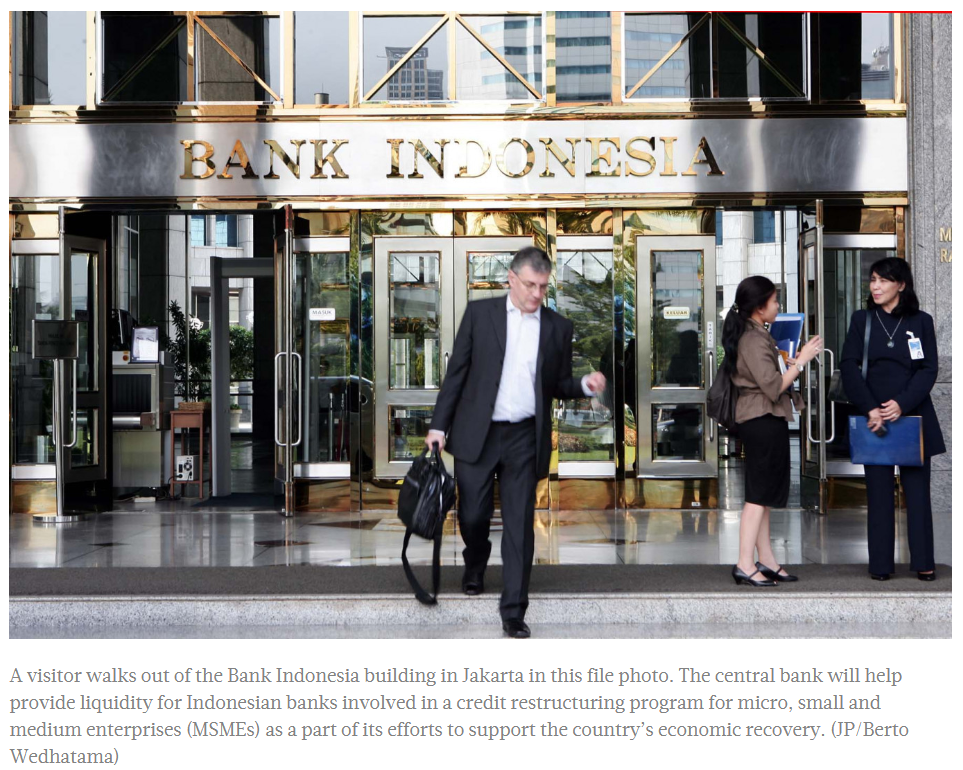Bank Indonesia to provide liquidity for banks involved in loan restructuring
Bank Indonesia (BI) will help provide liquidity for local banks involved in a credit restructuring program for micro, small and medium enterprises (MSMEs) as a part of its efforts to support the country’s economic recovery.
BI Governor Perry Warjiyo said Tuesday that banks could use sovereign debt papers they held as underlying assets for repurchase agreements (repo) with the central bank to get fresh funds.
Indonesian banks owned Rp 886 trillion (US$59.77 billion) in government bonds and could transact Rp 563.6 trillion worth with the central bank should they need liquidity. The remaining Rp 330.2 trillion is reserved for banks to maintain their liquidity needs.
“Overall, banks still have a lot of government bonds they can [use as underlying assets in] repos with the central bank in order to meet their liquidity needs for MSMEs’ credit restructuring,” Perry told reporters in a livestreamed news conference.
“Only a small number of banks own very few bonds and thus the government’s needs for fund placement will be very small,” he added.
The government has allocated Rp 87.59 trillion for fund placements in certain banks to support the MSMEs loan restructuring program. The fund placement is a part of the government’s national economic recovery (PEN) program worth a total of Rp 641.17 trillion to soften the impact of COVID-19 on small businesses as well as state-owned enterprises (SOEs).
The loan restructuring program is regulated in Financial Services Authority (OJK) Regulation No. 11/2020, which instructs financial institutions to provide relief for debtors affected by the pandemic. According to OJK data revealed earlier this month, 88 banks have provided 3.88 million borrowers with loan restructuring worth Rp 336.97 trillion.
The authority projected that 7.8 million borrowers might apply for the restructuring worth Rp 1.11 quadrillion at 110 banks.
Sunarso, the president director of state-owned Bank Rakyat Indonesia (BRI), which has restructured loans of 1.4 million MSMEs totaling Rp 101 trillion as of April, conceded that the program would affect its revenues and liquidity. He expressed hope that the government’s fund placement could help relieve the bank’s liquidity problems this year.
Banks had agreed to sell Rp 43.9 trillion worth of their government bonds to the central bank, Perry noted, adding that their liquidity remained “ample” to support economic recovery.
Fitch Ratings director for banks Gary Hannify also told The Jakarta Post recently that the country’s 12-largest banks had ample liquidity as reflected in the liquidity coverage ratio of about 180 percent at the end of 2019.
“We believe that lower loan growth together with various relief measures introduced by the central bank should help mitigate any potential pressure on funding and liquidity as a result of the coronavirus,” he said. “We expect these ratios to continue to be maintained with a satisfactory buffer throughout 2020.”
BI has lowered the reserve requirement ratio (GWM) for banks that provide loans to export-import companies, small and medium businesses, and other prioritized sectors to provide more liquidity. The policy was expected to boost the banks’ liquidity by Rp 117.8 trillion.
The central bank held its benchmark interest rate at 4.5 percent on Tuesday as it sought to maintain financial system stability over boosting higher economic growth.
It also announced purchases worth Rp 22.8 trillion in government bonds in the primary market as of May 14 and planned to buy an estimated Rp 150 trillion with lower yields than the market rate to help finance its economic recovery program.
“We are committed to supporting the government in financing the fiscal deficit and we are willing to share the burden of economic recovery,” Perry assured.
Source: https://www.thejakartapost.com/news/2020/05/20/bank-indonesia-to-provide-liquidity-for-banks-involved-in-loan-restructuring.html


 Thailand
Thailand




